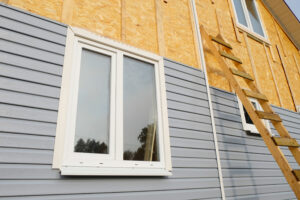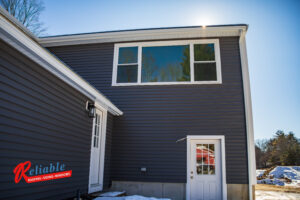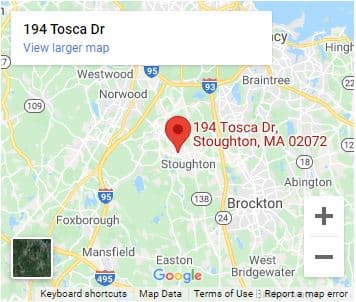When you start searching for ‘siding installation near me’, you’re not just looking for someone to nail up some panels on the side of your house. You’re seeking a professional who can enhance your home’s protection and curb appeal significantly. Finding the right siding contractor is crucial because siding plays a dual role: it shields your home from the elements and boosts its overall look.
To quickly find the best siding contractors in your area, consider the following points:
– Check for proof of insurance and licensing to ensure they’re qualified to do the job.
– Reviews can give you insight into their work quality and customer service.
– Get multiple estimates to compare pricing and understand the scope of work.
– Ask about warranties on both materials and labor.
Professional siding installation is about more than just aesthetics. It’s about protecting your most significant investment—your home. The right siding can ward off water damage, improve insulation, and even lower your energy bills. But these benefits only come with proper installation, which is why choosing a dependable contractor is paramount.

Whether you’re considering vinyl, wood, fiber cement, or another siding material, a professional installer will have the experience and tools needed to ensure the job is done correctly and efficiently. They can also advise on the best materials for your climate and home, providing a long-lasting solution that enhances your property’s value and appearance.
Understanding Siding Installation Near Me
When it comes to siding installation near me, knowing the process can help you understand what to expect. Let’s break down the steps, focusing on key aspects such as Snap the Chalk Reel, Starter Strip, Inside Corner Posts, Outside Corner Posts, Splicing, and Capping.
Snap the Chalk Reel
The first step in siding installation is to snap the chalk reel. This involves using a chalk line to mark where the siding will go, ensuring it’s straight and level. It’s a simple but crucial step for a professional-looking finish.
Starter Strip
The starter strip is the foundation of your siding installation. It’s the first piece installed at the bottom of your home’s exterior wall. This strip helps ensure that the first row of siding is secure and level, setting the stage for the rest of the installation.
Inside Corner Posts
Inside corner posts are used to join two walls at an interior corner. They create a smooth and seamless look, protecting the corner from water infiltration. Proper installation is key to prevent gaps and ensure the siding functions correctly.
Outside Corner Posts
Similar to inside corner posts, outside corner posts cover the exterior corners of your home. They provide a clean, finished look while also protecting the siding ends from the elements. Correct installation ensures durability and resistance to weathering.
Splicing
Splicing refers to the method of joining two siding panels end to end when one panel is not long enough to cover an entire section. The goal is to make the splice as invisible as possible, maintaining the aesthetic appeal of your siding.
Capping
Capping is the process of covering exposed areas, such as the top of windows and doors, with a special trim or cap. This not only adds to the visual appeal but also increases the siding’s effectiveness by providing additional protection against water damage.
Understanding these steps is crucial for a successful siding installation. Each plays a vital role in ensuring the siding not only looks good but also provides the necessary protection for your home. When searching for “siding installation near me,” ensure the contractors you consider are knowledgeable and experienced in these areas. Proper installation techniques are key to maximizing the lifespan and effectiveness of your siding, making it a worthwhile investment for your home’s exterior.

Choosing the Right Siding Material
When it comes to siding installation, selecting the right material is crucial. This choice affects not just the appearance of your home but also its durability, maintenance needs, and how well it stands up to the elements. Let’s dive into the most common siding materials: Vinyl, Wood, Fiber Cement, and Exterior Insulation Finishing System (EIFS).
Vinyl Siding
Vinyl siding is a popular choice for many homeowners due to its affordability, durability, and low maintenance requirements. It doesn’t need painting, resists moisture, and can easily be cleaned with a hose. However, it may not hold up as well in extremely harsh weather conditions compared to some other options.
Wood Siding
Wood siding offers a timeless and natural look that many homeowners love. It can be painted or stained in any color, allowing for flexibility in design. However, wood requires more maintenance than vinyl or fiber cement, including regular painting or staining to prevent decay, moisture absorption, and insect damage.
Fiber Cement Siding
Fiber cement siding is known for its robustness and versatility. It can mimic the appearance of wood, brick, or stone and is resistant to fire, pests, and rot. While it may have a higher upfront cost than vinyl, its durability and low maintenance needs make it a cost-effective choice over time. Fiber cement siding also comes with warranties that can last up to 50 years, offering peace of mind regarding its longevity.
Exterior Insulation Finishing System (EIFS)
EIFS provides excellent insulation and a smooth finish that mimics the look of stucco. It’s lightweight and can significantly improve your home’s energy efficiency. However, it requires professional installation to ensure proper water drainage and prevent moisture problems.
Durability
When comparing siding materials, consider your local climate and environmental conditions. Fiber cement and vinyl are particularly suited for areas with harsh weather, offering significant wear and tear resistance. Wood, while durable with proper maintenance, may not fare as well in extremely wet or insect-prone areas.
Maintenance
Maintenance is a key factor in your decision. Vinyl siding is often considered maintenance-free, needing only occasional cleaning. Fiber cement also requires less upkeep than wood, which needs regular treatment to maintain its appearance and durability.
In conclusion, the right siding material for your home depends on a balance of aesthetics, durability, maintenance, and budget. When searching for “siding installation near me,” discuss these options with your contractor to ensure you make an informed decision that meets your needs and preferences. This careful selection process will ensure your home’s exterior remains beautiful and durable for years to come, moving us into the next crucial step: finding the best siding contractor to bring your project to life.
How Long Does Vinyl Siding Last?
When considering siding installation near me, one of the most popular choices homeowners lean towards is vinyl siding. Its popularity is not without reason. Vinyl siding offers a blend of durability, aesthetic appeal, and cost-effectiveness that appeals to many. Let’s break down the essential aspects of vinyl siding’s lifespan: Durability, Climate Conditions, Maintenance, and Lifespan.
Durability
Vinyl siding is designed to withstand many of the challenges that nature throws at it. It’s resistant to fading from the sun, damage from rain, and even the growth of mold and mildew. This resilience makes it a favorable choice for many homeowners. However, it’s not invulnerable. Extreme weather conditions, such as hail or very high winds, can cause damage.
Climate Conditions
The climate where you live plays a significant role in how long your vinyl siding will last. In areas with severe weather conditions—be it extreme heat, cold, or storm-prone regions—the siding may show signs of wear more quickly. However, modern vinyl siding is manufactured to withstand a wide range of climate conditions, making it a versatile option for almost any location.
Maintenance
One of the appealing features of vinyl siding is its low maintenance. Unlike wood siding, which may require periodic painting or staining, vinyl siding needs only a simple wash with mild soap and water to keep it looking new. This ease of care contributes to its longevity, as regular cleaning helps prevent the buildup of dirt and grime that can lead to wear over time.
Lifespan
So, how long does vinyl siding last? On average, you can expect vinyl siding to last between 20 to 40 years. This range can vary based on the factors mentioned above, such as the quality of the installation, the climate, and how well it’s maintained. Some manufacturers offer warranties that extend up to 40 years, which speaks to the confidence in the product’s durability.
In conclusion, when searching for siding installation near me, it’s worth considering vinyl siding for its durability, minimal maintenance requirements, and relatively long lifespan. Proper installation by a reputable contractor can ensure that your home enjoys the full benefits of this popular siding option for many years to come. The importance of selecting the right contractor for the job cannot be overstated.
Finding the Best Siding Contractor
Finding the right contractor for your siding project is crucial. A good contractor can make the difference between a stress-free experience and a problematic one. Here’s how to ensure you’re choosing the best siding contractor for your needs.
Proof of Insurance
First things first, always check for proof of insurance. This includes both liability insurance and workers’ compensation. Insurance protects you and your property in case of accidents or damage. A reputable contractor will have no problem showing you their insurance certificates.
Licensing
Next up is licensing. Ensure the contractor is licensed to work in your area. Licensing indicates that the contractor has met certain standards and is authorized by local authorities to perform siding installations. You can usually verify a contractor’s license through your local government website.
Reviews
Reviews are your best friend in the search for a reliable contractor. Look for feedback from previous customers to gauge the quality of work and customer service. Websites like Yelp and the Better Business Bureau are good places to start. No contractor will have a perfect score, but consistent positive feedback is a good sign.
Estimates
Get written estimates from multiple contractors. This should include all costs associated with the project, from materials to labor. Beware of estimates that seem too good to be true; they often are. A detailed estimate helps compare between different contractors and prevents surprise charges later on.
Warranties
Inquire about warranties. A trustworthy contractor will offer warranties on both materials and labor. This shows they stand behind their work and are committed to quality. Warranties can give you peace of mind knowing that you’re covered in case something goes wrong.
Trust Your Gut
Finally, trust your gut. After meeting with contractors, consider who communicated best, seemed most professional, and genuinely interested in your project. If something feels off about a contractor, it’s better to keep looking. Your comfort and confidence in a contractor are invaluable.
By focusing on these key areas—insurance, licensing, reviews, estimates, warranties, and your own instincts—you’ll be well on your way to finding the best siding contractor for your project. The goal is not just to find someone who can do the job, but someone who can do the job right.

Questions to Ask Your Siding Contractor
When you’re on the hunt for “siding installation near me”, you’ve got to know the right questions to ask. This is like your cheat sheet to make sure you’re picking the best person for the job. Let’s dive in:
Project Duration
- How long will the job take?
This is super important because you need to know how long your daily routine will be affected. A good contractor will give you a clear timeline.
Business Experience
- How many years have you been in business?
Experience matters. You want someone who’s seen it all and can handle any surprises that come up.
Siding Recommendations
- What type of siding is best for my home?
There are lots of options—vinyl, wood, fiber cement. Ask them what they recommend and why. This can tell you a lot about their expertise.
Warranty Coverage
- Do you offer a warranty, and what does it cover?
You want peace of mind. Make sure they offer a warranty that covers both materials and labor.
References
- Can you provide references from customers with similar projects?
Real feedback from past customers can give you insight into their work quality and reliability.
Insurance
- Are you insured?
This is a deal-breaker. They need to have liability insurance and worker’s comp to protect you and them during the project.
Specialty Training
- Do you have any specialty training or certifications?
If you’re choosing a specific type of siding, it’s a plus if they have specialized training in installing it.
Free Estimates
- Do you offer free in-person estimates?
You should never have to pay just to find out how much the project might cost. Plus, an in-person estimate means they can give you a more accurate quote.
Debris Management
- Who is responsible for the cleanup of debris and waste?
You don’t want to be left with a mess. A good contractor will handle all the cleanup, so you don’t have to.
The right questions can lead you to the right contractor. Don’t be shy—ask away! This is about protecting your home and making sure you’re happy with the end result. With these questions in your back pocket, you’re ready to find the perfect siding contractor for your project.
Next, we’ll move into the conclusion, wrapping up everything we’ve learned about finding the best siding contractor for your needs.
Conclusion
As we wrap up our guide on locating the best siding contractors in your area, we want to emphasize the importance of choosing a company that stands out not just for its ability to install siding but for its commitment to excellence, extensive experience, and solid warranties. That’s where Reliable Roofing truly shines.
Reliable Roofing: A Commitment to Excellence
At Reliable, we don’t just install siding; we ensure that every aspect of your siding project is handled with the utmost care and professionalism. Our team is dedicated to providing top-notch service from start to finish, ensuring that your home’s exterior is not only beautiful but also durable and well-protected against the elements.
20+ Years of Experience
With over two decades in the business, our experience speaks for itself. We’ve worked on countless homes, mastering the intricacies of siding installation and staying up-to-date with the latest materials and techniques. Our extensive experience means we can tackle any challenge that comes our way, ensuring a smooth and successful installation every time.
Reliable Warranties
We understand that your home is a significant investment, and protecting this investment is our top priority. That’s why we offer reliable warranties on both materials and labor. Our warranties are designed to give you peace of mind, knowing that your siding is covered against defects and damages. We stand by our work, and our warranties reflect our confidence in the quality of our services.
Choosing the right contractor for your siding installation project is crucial. You want a team that not only has the skills and experience to do the job right but also values your satisfaction and the longevity of their work. With Reliable Roofing, you’re choosing a partner committed to excellence, backed by years of experience and solid warranties.
As you consider your options for ‘siding installation near me’, Reliable Roofing is here to help. Our commitment to excellence, combined with our extensive experience and reliable warranties, makes us the ideal choice for your siding project.
Ready to start your siding project with a team you can trust? Visit our siding contractor service page to learn more about how we can bring your vision to life.
Protecting your home and ensuring your complete satisfaction is our mission. Let us show you the Reliable difference, and why so many homeowners choose us for their siding installation needs.



